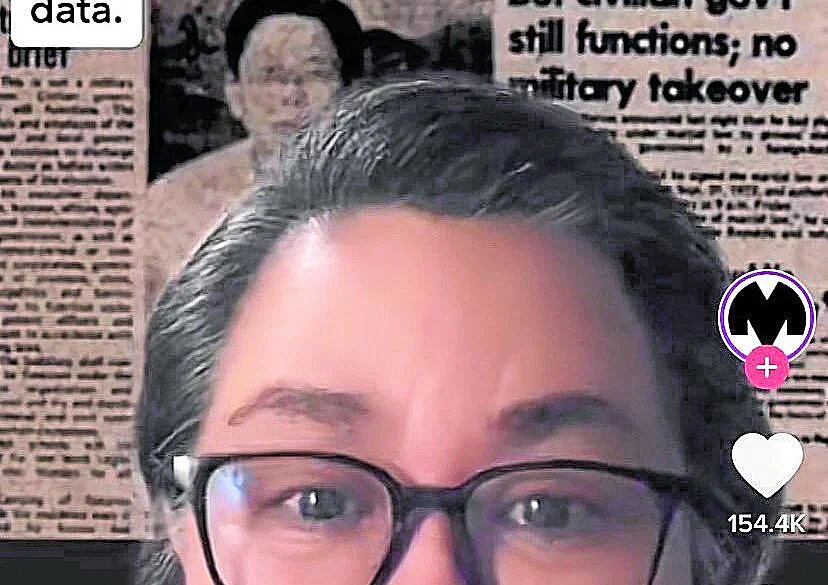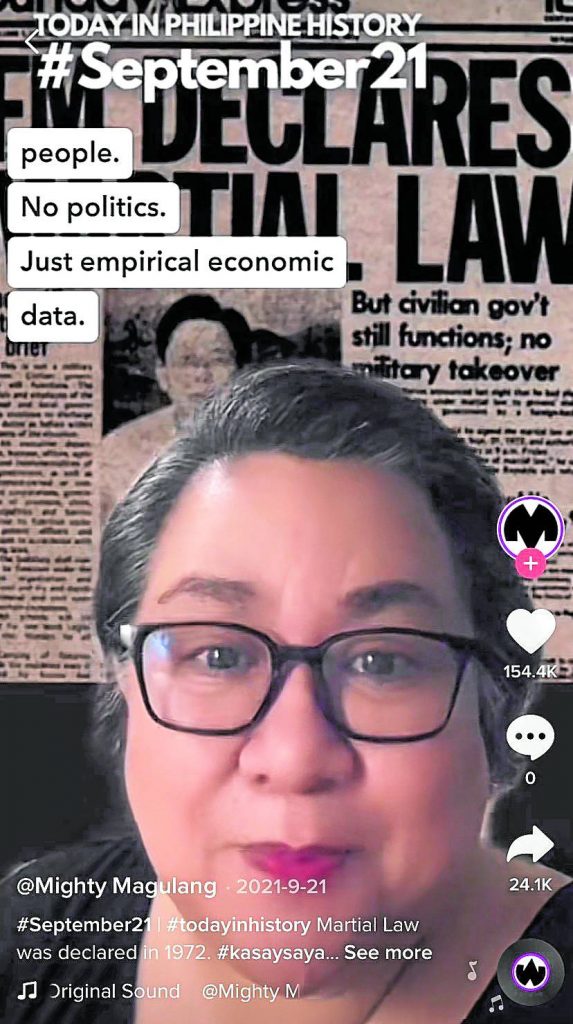By: Nikka G. Valenzuela

Just like any other social media platform, TikTok, the hot social network for making and sharing short videos, is teeming with false narratives of martial law. A quick search of the term reveals many faceless videos that claim that the more than two decades of Marcos rule was the golden age of the Philippines—a pretty common lie perpetuated on the internet.
But among the sea of false claims and outright lies about the Marcos dictatorship, one TikTok video stands out: “the macroeconomic effects of the Marcos era to the lives of Filipino people” by Mona Magnu Veluz (@mightymagulang).
Veluz compares wages of Filipinos from 1962 (before Marcos entered office) to 1986 (when the late dictator was ousted in a bloodless revolution). She likewise tackles the massive debt that the Philippines incurred; the rise of the unemployment rate and the increase of the number of people who lived on the poverty level compounded by the fact that the prices of basic commodities shot up.
The history geek and genealogist who has a masters degree in Applied Business Economics hosts a TikTok series called “Today in History,” and for Sept. 21, 2021, she decided to talk about facts that could not be contested: numbers.
“I also was triggered by the fact that I saw several videos coming into that time that were saying that martial law was our golden years. And I looked at why they felt it was the golden years. They were talking about infrastructure, they were talking about questionable metrics, infrastructure. Yeah, I get the volume of buildings that were built, but there was really very little understanding from a macroeconomic perspective,” she told Lifestyle in an online interview.
1.6 million views
To make the video more approachable to viewers, Veluz said she selected numbers that were easily understandable.
“I really selected the simplest macroeconomic numbers that I could think of, and that would also reflect the things that people can feel, because everything else like infrastructure spending ratio, to GDP (gross domestic product), sometimes people don’t feel that, but wages, poverty level, that they can understand. And the reason I also brought up the loans is because for us Filipinos, we understand the concept of loan and credit card,” she added.
The video is the top result on TikTok (1.6 million views) upon searching “martial law” and has gained traction on social media sites. The video has become so popular that on top of citing sources, Veluz made a Google Doc explaining economic terms such as nominal and real wages, inflation and the like.
A lot of TikTokers like Veluz use the platform to counter false narratives on the social media platform. Veluz said there are professionals, entrepreneurs, doctors who make breakdown videos to debunk clips that spread false claims. They also jump into each other’s livestreams to talk about martial law.

Need for truth commission
According to former Philippine Commission on Good Government chair Ruben Carranza, countering outright lies about the Marcos dictatorship does not simply mean teaching history correctly.
“The medium of teaching history and correcting false narratives by themselves can’t really counter social media as quickly as social media creates fabricated history and spreads it,” he said in an online interview.
Carranza, who is now with the International Center for Transitional Justice, explained that “The effort to establish a full narrative of what happened during the Marcos dictatorship and the initiative of taking that should have happened as soon as the dictatorship ended.”
He pointed out that the structures that created the dictatorship were left untouched after Marcos was ousted, and that the efforts in preserving the memories of the human rights violations and massive corruption during the martial law years took decades to materialize. One of these is the memorialization commission, which was created by law in 2013, about 27 years after the People Power Revolution.
The martial law museum, which will rise at University of the Philippines, Diliman, “will have to bear a lot of weight,” he added.
“It will have to carry such a burden that I think having a structure and having programs will help—people can see it, people can visit it. But then it would be insufficient because, like I said, you will have to deal with the baggage of decades because, in the meantime, the family and the network of families that you’re trying to account, they didn’t just sit idly and hide,” Carranza added.
But it’s not too late to counter the lies, he said. With or without the coming elections, there should be a truth commission to establish a full narrative on the martial law years, as well as reparations for victims and prosecution of human rights violations perpetrators.
Use social media to mobilize
He also noted that while social media has sometimes been portrayed as “a weapon against truth,” the internet has been utilized to actually overthrow entrenched authoritarian regimes like with the Arab Spring, which started in Tunisia in 2010.
“There was still a dictator in power, but it spread on the internet and social media was used by young people during the Arab Spring to resist dictatorship, to overthrow a dictator. It is possible to use social media to organize and mobilize,” he said.
The problem, however, is that social media has prioritized profits over communication.
“We should not see social media as inherently enablers of dictatorship and false histories, but at the same time, we must be very conscious of being used ourselves because we are consumers of social media for profit,” Carranza said.
He added: “So the solution in many ways is to also go on social media, but to go on social media with both an official narrative behind you, and a strategic, more realistic sense that your opponent has had a 20-30 year lead on you. You’re playing catch up. So again, the election is a good way to test how far you can catch up. But to be realistic, I think it’s important to remember to do this even beyond the election.”
It’s also important, he said, to go beyond the online space and look for local venues to reach out, especially with the history of local resistance to the Marcos dictatorship.
Veluz said that while TikTok is not meant to be a scholarly platform and bashers keep throwing mean comments, she and other users cite their sources.
“If you’re trying to win somebody, you don’t fight them even if they are very aggressive. You be as civil as you can. But you also stand your ground not when you’re, ‘I will call you out when you’re lying. Here’s the truth. These are my sources. This is the context.’
“I’ve seen a lot of good people step up to help fix what’s happening. I don’t know if it’s enough. There’s still a lot of people who are also throwing out opposite messages.” INQ
Source: https://lifestyle.inquirer.net/394819/on-tiktok-she-debunks-lies-about-martial-law-with-numbers/
